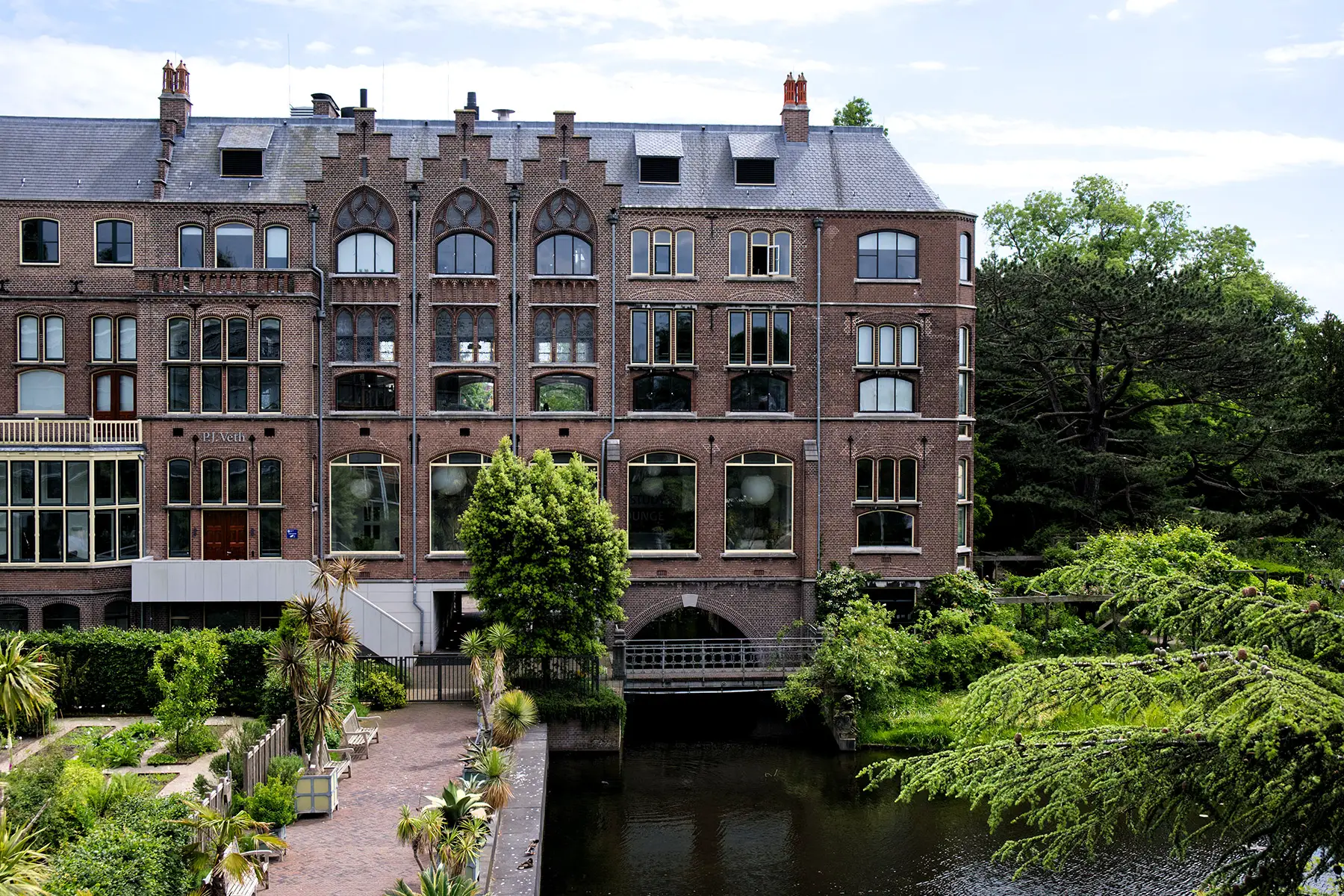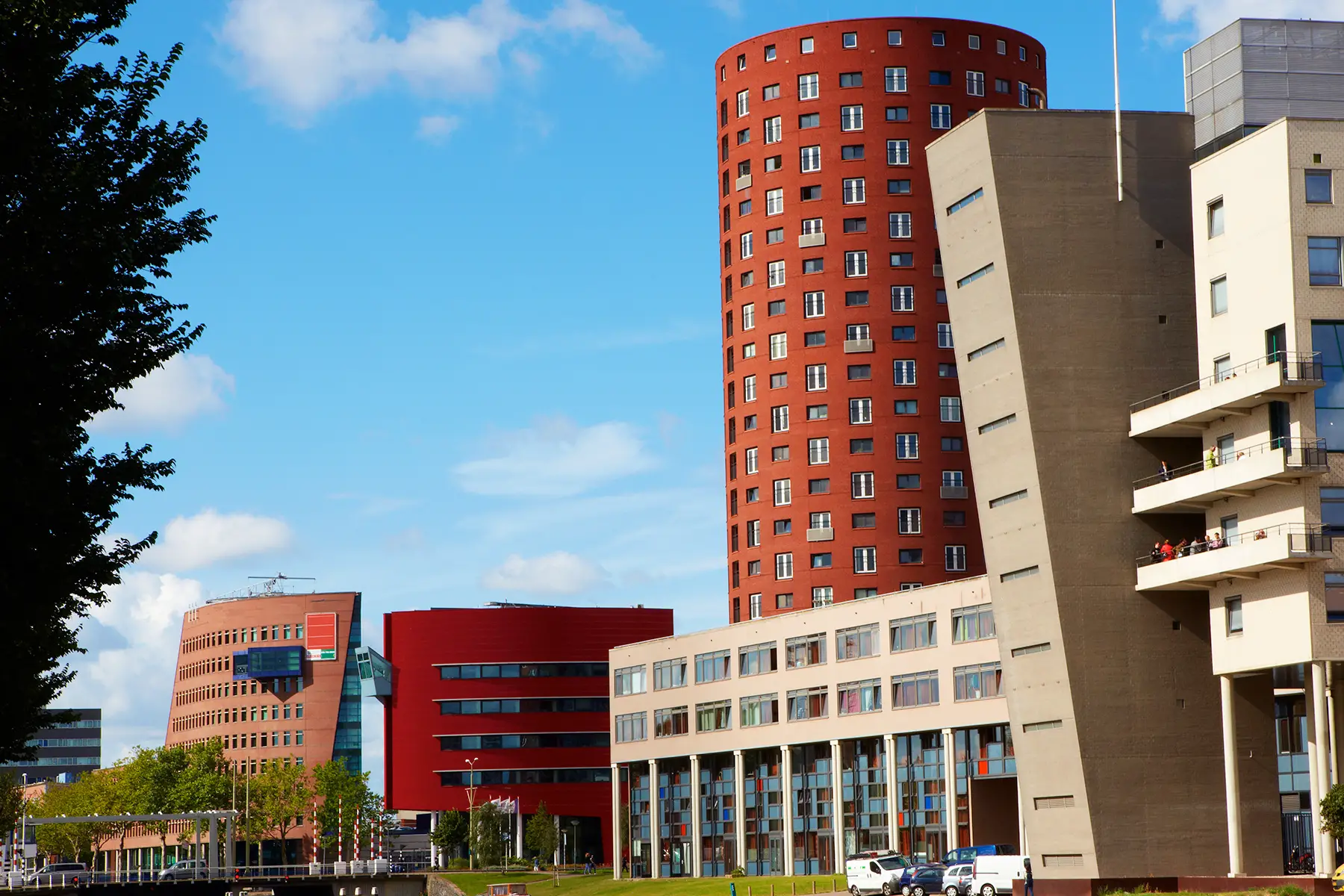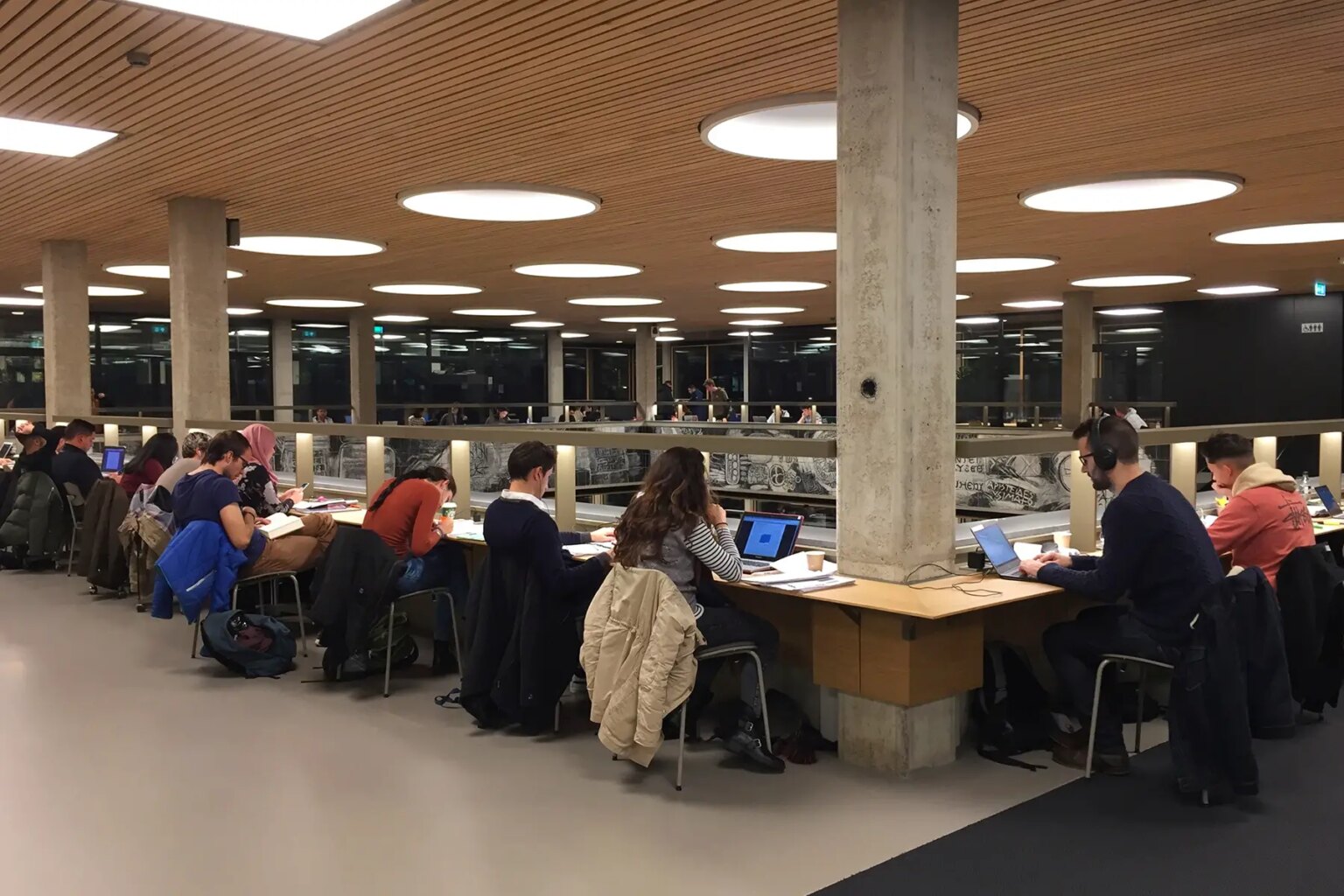University applications can be challenging at the best of times. For international students looking to pursue higher education abroad, it can seem even more intimidating. Fortunately, the Dutch have a long history of hosting students from all over the world, so those looking to study in the Netherlands should be able to fit in.
We’ll walk you through the process from start to finish – including program options, costs, visas, and what to do after graduation.
Keep reading to find out about:
ABN AMRO
If you’re looking for a student bank account in the Netherlands, try ABN AMRO. They offer free accounts for students including a debit card. You can also connect it to services such as GooglePay, Apple Pay, and OVPay. Open an account from your mobile in just 5 minutes with ABN AMRO.
Higher education in the Netherlands
The Dutch higher education landscape has a variety of options – many more than some other countries. Due to the Dutch educational system, students are placed into different academic or vocational tracks starting at age 12. These tracks determine whether they follow education to begin working, enroll in a professional program, or attend university. In total, 38% of Dutch adults have a tertiary education.

The Netherlands attracts students from all over the EU and the world. In fact, in 2021, 40% of incoming first-years were international students. Because the Netherlands is an educational hub, many universities offer English-language courses of study, especially in bigger cities; however, since the national language is Dutch, most programs either teach in Dutch or expect graduates to know Dutch. Though each university sets its own dates, the university term usually follows a semester system – the first semester generally runs from September to January, and the second from February to July. Usually, the soonest a student can apply for university is aged 18, but many students begin later. The two main higher education options are to attend a university of applied sciences or a research university.
Types of higher learning institutes
University of applied science
A university of applied sciences (HBO) offers higher education geared towards a particular profession. These courses tend to be more practical and offer both bachelor’s and master’s degrees. Examples of study programs include engineering, data science, and industrial design.
Research university
Research universities (WO) are considered the highest academic level of study. As well as offering a more theoretical education, they prepare students to conduct independent research. Research universities offer bachelor’s, master’s, and doctoral programs. Examples of degrees include communications, business administration, law, and politics.
Dutch degree programs
For those looking to study in the Netherlands, there are plenty of degree programs available:
Associate degrees
Recently, Dutch universities have begun offering Associate degrees. These two-year programs take place at a university of applied sciences – programs usually have a practical of vocational focus, such as business, healthcare, agriculture, or engineering. Afterward, students may go directly into the workforce or continue to a bachelor’s degree at a university of applied sciences. Admission requirements may vary, but programs typically want a HAVO, VWO, or level 4 MBO diploma.
If you’re looking for an Associate program, here are some strong places to start:
Bachelor’s degrees
Dutch universities offer Bachelor of Arts and Bachelor of Science degrees, though admission requirements will depend on the university and program. A full-time bachelor’s at a university of applied sciences takes four years. To enter these programs, you’ll need to have graduated from senior general secondary education (HAVO) or equivalent. On the other hand, a full-time bachelor’s degree at a research university takes three years, and you’ll need to have graduated from a university preparatory education (VWO) or equivalent.
Here are two of the top universities for bachelor’s programs in the Netherlands:
Master’s degrees
Dutch universities also offer various master’s degrees. A master’s at a university of applied sciences usually takes a year, full-time, though some programs offer two-year master’s. Students then graduate with one of the following degrees: Master of Arts (MA), Science (MSc), Business Administration (MBA), Social Work (MSW), or Education (Med). To gain admission, you will need a bachelor’s degree from a research university or a university of applied sciences; some programs also require work experience.

Conversely, master’s programs at research universities only admit students with a bachelor’s from a research university or equivalent. Full-time programs can last anywhere from one to three years, depending on the program of study. Students then graduate with a Master of Arts (MA), Science (MSc), Laws (LLM), or Business Administration (MBA).
Here are some of the top universities for master’s programs:
Postgraduate programs
Those looking to get a Ph.D. will find plenty of options in the Netherlands. However, because of the advanced academic nature of Ph.D.s, only research universities offer them. These programs can last four to six years, depending on the institution and the researcher. Most universities will require either a master’s or a research master’s degree in a relevant field of study.
Top universities offering Ph.D. programs in the Netherlands include:
Dutch qualifications
Academic qualifications in the Netherlands are internationally recognized. Within Europe, the Dutch education system honors the Bologna European Credit Transfer and Accumulation System (ECTS), which holds educational standards throughout European member countries. So, a Dutch bachelor’s or master’s degree is generally academically valid throughout Europe and the rest of the world.
General requirements to study in the Netherlands
If you are hoping to study in the Netherlands as an expat, here are a few key things you’ll need to plan for.
Visa requirements
Your study visa requirements in the Netherlands will depend on your nationality. If you are an EU/EEA citizen, you have the same rights to study as Dutch students. You’ll face no extra barriers other than ensuring that you register with your local municipality. If you hold a passport from outside the EU, you’ll need to apply for a visa or residence permit to study in the Netherlands. Certain non-EU nationals, like Americans and Australians, may enter the Netherlands without a visa and complete the residence permit paperwork after landing. Many other countries must apply for an entrance visa as well.
It’s important to remember that if you are a non-EU student, you must prove that you have enough funds to support yourself for the duration of your time in the Netherlands. This is called the study norm. The required amount changes each year, but for 2022, it is €932.87 per month. You will need to provide income statements proving that you have a lump sum of this monthly amount multiplied by the length of your study program.
Language requirements
Fortunately, because so many expats choose to study in the Netherlands, you’ll find no shortage of programs in English. Of course, certain courses of study are either taught in or require a mastery of Dutch – but those are often programs for people who plan to live and work in the Netherlands indefinitely. If Dutch is not necessary for your career, you’ll find many institutions throughout the country offering English-language programs. However, if you would like to learn some Nederlands to become more familiar with life in the Netherlands, there are plenty of options to learn Dutch.
Getting overseas qualifications recognized
The required educational qualifications vary by institution. Of course, if you come from a European country, the education metrics will transfer fairly smoothly. This is also true if you study at an International Baccalaureate (IB) program elsewhere. However, most institutions will have policies and recommendations for how to get your transcripts recognized, certified, or translated to allow you to apply. Additionally, they may inform you of specific courses you need to complete before being allowed to enroll. For example, the University of Amsterdam has a convenient Diploma Calculator that helps clarify requirements per country. Additionally, Nuffic researches foreign diplomas and compares them to Dutch ones. In any case, be sure to reach out to the university you are interested in for further details.
How much does it cost to study in the Netherlands?
Study costs depend on the institution and your nationality. For bachelor’s programs, prices for EU students range from €1,000–2,500 per year, and EU students can access the same student financing options as Dutch students. Tuition fees for non-EU students range from €6,000 to €15,000 per year.
For EU master’s programs, the costs are comparable to bachelor programs, ranging from €1,000–2,500 per year, with similar student financing options to Dutch students. Non-EU master’s students pay a higher yearly rate of between €8,000–20,000 per year, depending on the institution. Tuition at both levels is usually charged on a semester basis, just prior to the start of the semester. Your institution will advise you on the best payment methods.

Fortunately, paid Ph.D. programs are common throughout the Netherlands, so you would be hired by the university as an employee and receive a salary. Of course, these programs are highly competitive. Some universities also offer Ph.D. training programs, which are slightly less competitive because they charge tuition fees; these fees depend on the institution but are similar to master’s level fees. Some universities also accept externally funded Ph.D.s, provided the student finds the funding.
You’ll also need a Dutch bank account when you arrive in the Netherlands – this is especially helpful as many supermarkets and other shops only accept card payments. In addition, many only accept Maestro, which is uncommon in other countries. Banks such as ABN AMRO offer accounts specifically for students as well as credit cards and student insurance.
Study grants and funding available
Many people seek funding to pay for higher education, whether this is loans, grants, or family support. In the Netherlands, the government usually provides funding options. Though some institutions or departments may offer merit scholarships, it is more common to get financing through the government. Some students may find and apply for private scholarships that may then be applied to a Dutch university, while others may be able to use educational loans from their own country. To find out your specific options, consider speaking to a university representative.
Dutch government study financing
The Dutch government offers various financing options through DUO (Dienst Uitvoering Onderwijs). You can apply for this financing online. Options include:
- Tuition loans, which can only be applied to the cost of tuition and are sent directly to the university.
- Regular loans, which can include tuition and other living expenses, often going to the student directly.
- Supplementary grants, which do not need to be paid back.
Make sure you keep an eye on interest rates so you’ll be aware of what you need to repay. Repayments generally depend on how much you earn, and graduates on a low income do not begin repaying their debts.
It’s important to keep in mind, however, that only certain nationalities are eligible for study financing. Specifically, these options only apply to people with Dutch, EU, EEA, Swiss, and British passports. For those with other passports, financing options will need to come from private scholarships, family support, or other loans, perhaps from their own country.
How to apply to study in the Netherlands
Application requirements to study in the Netherlands will vary based on the institution, level of study, and the student’s nationality. Generally, you apply to the individual university, submit all required fees and documents, and then receive an admissions letter. Your required documents will vary, but will usually include transcripts of prior education, English-language proficiency (if necessary), and whatever your particular department requires, such as essays of intent or assessments.

If you are an EU student, your next steps will mostly involve figuring out your finances and housing options. If you are a non-EU student, once you are admitted, your university apply for a study permit. During this process, you must provide all the documents that your institution requires. The Dutch immigration authorities will decide within 60 days on your case. Your university liaison will then advise you on how to proceed.
What’s student life like in the Netherlands?
The Netherlands offers a vibrant student life. Depending on your program, you may have mostly larger lectures or smaller classes and seminars. Your program might prioritize group work or require you to work mostly independently. The amount of time you’ll spend studying will depend on your workload. However, it is very common to find libraries, cafes, and outdoor areas on campus full of hard-working students, especially around finals. So be sure to scope out your favorite study nooks early on! It’s also essential to register with the municipality within five days of arrival. Fortunately, your university will help facilitate this process, and you should receive notifications with further instructions about registration days. If you miss the registration days, you’ll need to register on your own at your local municipality.

Outside the classroom, most universities have various clubs and student associations based around politics, ethnicities, gender and sexuality, academics, religion, and art. When doing your research, be sure to explore whether the groups operate primarily in Dutch or English, as the former is quite common in some universities. Finally, for those who enjoy culture and nightlife, the Netherlands offers it all. From year-round festivals to iconic King’s Day celebrations, the Netherlands is truly a young person’s paradise, with options for everyone.
Student housing options in the Netherlands
Because it is such a popular destination, finding housing in the Netherlands is extremely difficult. It’s not common for students in the Netherlands to live on campus. Instead, they usually rent accommodation from one of the various housing organizations. These organizations provide different short and medium-term housing options for students. Options include shared houses, flats, or studios and may range from €300 to €900 per month. Otherwise, if you have a bigger budget, you can find accommodation in the regular rental market. Sites offering accommodation include:
Can you work while studying in the Netherlands?
Work requirements for students in the Netherlands vary by nationality. EU nationals studying in the Netherlands have no limitations on how much or where they can work. Non-EU students, however, do have some restrictions. Specifically, they need a work permit, and their employer must apply for it. Usually, employers must begin this process five weeks before your start date. Even with the work permit, non-EU students may work only 16 hours a week during the school year or full-time during the summer (June, July, August). Keep in mind, however, that you can only work if it doesn’t interfere with your studies.
Volunteer work
Some students like to volunteer or do an internship outside of school. For EU students, there are no restrictions – they can volunteer and intern as much time as they would like. Non-EU students may also volunteer and intern – fortunately, they do not need a work permit to do so. Those looking to volunteer simply need to finalize their volunteer placement and sign a Volunteer declaration (Vrijwilligersverklaring). The organization must also sign this. Interns, meanwhile, need to sign an Internship agreement along with the employing organization. Keep in mind that some volunteer placements and internships may offer a stipend and depending on the amount, this may be taxable income. If you’re looking for a volunteer opportunity, volunteering.nl is a good place to start.
Dutch student healthcare
Your student healthcare requirements in the Netherlands depend on your nationality and study status. EU students can apply for a European Health Insurance Card (EHIC), which allows you to have discounted or free healthcare throughout Europe. So, as a European student, you will continue to have healthcare in the Netherlands.
If you are a non-EU student studying in the Netherlands, your healthcare requirements depend on whether you are working. If you do not work during your studies, you cannot to take out Dutch health insurance. So, you must have private health insurance that provides coverage in the Netherlands. If, however, you are doing paid work, even if part-time or an internship, you are required to take out Dutch health insurance.
Study exchange programs
Understandably, the Netherlands is a very popular study abroad destination for people from all over the world. Whether for a semester, or a year, foreign students are always filtering in and out of Dutch cities. One way to study abroad in the Netherlands is through your home university; visit your university’s study abroad office to find out whether your institution has any ties to Dutch universities or allows its students to study there and transfer credits.
The other very popular alternative for those studying at European universities is the Erasmus Program. Erasmus allows students to do an exchange at partner schools ranging from two months to a year. To be eligible, you must be enrolled in a higher education program that has an agreement with Erasmus; additionally, your study abroad choice must be in line with your academic goals. To apply, you’ll need to go through your university’s Erasmus office or liaison.
Career prospects after graduation
Once you graduate from university in the Netherlands, you have plenty of industry options. The country is home to many large tech, automotive, and shipping companies, and a bustling arts, non-profit, and start-up scene. Of course, some jobs are more in-demand than others, but, on the whole, there are plenty of opportunities for recent graduates who are hoping to work in the Netherlands after their studies.
The job search process for EU citizens is much more straightforward than for non-EU citizens. EU nationals who receive position offers can legally work in the Netherlands without many extra barriers. However, non-EU nationals who are offered a position must be sponsored by their employer, a process that involves a minimum salary and other regulations. Fortunately, non-EU students can apply for an Orientation Visa for Highly Educated Persons – this grants them a year to seek employment and work under certain conditions. At the end of the year, the graduate must either have found sponsored work or leave the Netherlands.
Useful resources
- IND – Immigration and Naturalization Service
- European Commission – Applying for a European Health Insurance Card (EHIC)
- Study in NL – Government regulations on student healthcare
- Nuffic – Dutch organization for internationalization in education









